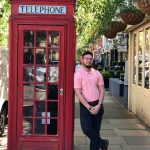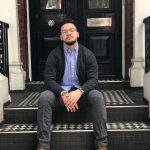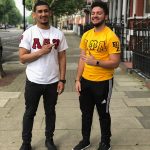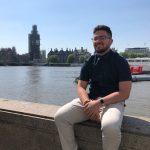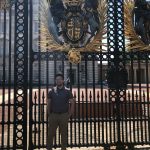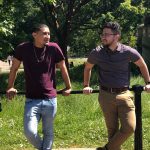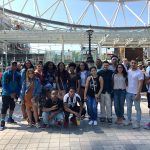The UConn Education Abroad program allows students to gain rich experience in other cultures by immersing themselves in the educational and social life of another country. At UConn, more than 400 programs are available, spanning 54 nations. In the 2017-18 academic year, about 19 percent of the graduating class had participated in one of the programs, well above the national average of 10 percent. More than half of those students had spent a semester or year in another country. Here is one of them.
Name: Omaniel Ortiz
Year: Junior
Major: Exercise Science
Education Abroad program: London, England, summer 2018
About: Omaniel Ortiz grew up in Hartford, Connecticut, and graduated from A.I. Prince Technical High School. He is part of the Student Support Services (SSS) program at UConn, which assists students who are first-generation to college, from low-income families, and from populations underrepresented in higher education. After graduation, Ortiz hopes to go to medical school for three years with the goal of becoming an inpatient pediatric physical therapist.
What was it like to travel to a foreign country?
It was my first time traveling away from the United States, and only the second time I had been on an airplane. It was really phenomenal. I had no idea what to expect – it’s another country and I didn’t know what things were going to look like. The funniest part was when we landed at the airport, it looked like we were still in Hartford, maybe not as different as you would think. But once we got into the city, you could see the buildings were different and the culture changed. I felt comfortable because I was with other SSS students and my advisor Chelsea [Cichocki]. If it wasn’t for SSS, I don’t think I would have been able to do Education Abroad.
What was living in London like?
We had a suite in the city. I didn’t expect how much diversity there was in London. You would walk out on the street and hear so many different languages, which was new for me. You walk on streets here, you hear English, maybe some Spanish. There, you heard a lot of languages. Also, I had to get used to seeing people drive on the other side of the street. It was interesting how many people used the Tube [London Underground]; they rely on public transportation. You saw nice cars outside with dust and spider webs because they had not been used for so long. That was interesting to me.
How was the academic experience?
We took a three-credit class on the history of London with a professor from England. We would go visit various places and then do presentations on them. We saw a play at Shakespeare’s Globe, and went to the Museum of London. We went to the Houses of Parliament and learned the way that their government works. We visited different sections and parts of London. We visited where the [2017] bombing happened. We also toured the Foundling Museum, where parents would leave their children if they could not take care of them [in the 1700s]. The parents would leave a small object with their children so they would have something from their parents. It was sweet to see those little items.
We got back to America and realized how certain things are so different over there and wondered why they can’t be that way here. People seem to talk and engage more over there. It seems to be more hostile over here.
What did your family think of you going to London?
My mother, Sonia Rodriguez, was ecstatic. She is from Puerto Rico and I’ve never been to Puerto Rico. She was concerned about me going at first, but she soon had no worries. I would get in touch with her by Facebook Messenger and tell her what I did. She was excited.

